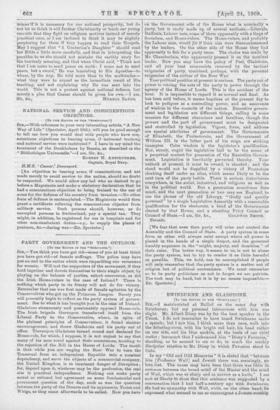PARTY GOVERNMENT AND THE OUTLOOK.
[To MI F.IDITOtt 07 THII "SACTATOP.."j SIR,—Yon think you have got rid—some Of you it least think you have got rid—of female suffrage. The police may have put an end to the antiCs which were imperilling our reverence for women. Will not the supporters of the movement, if they bold together and devote themselves to their single object, by playing on the balance of parties, extort concession, its did the Irish Home-rulers in the 08.80 of Ireland P There is nothing which party in its freaky will not do for victory. Remember that use was first made of feinald agitation by the Conservatives who got up the Primrose League. Surely you will presently begin to reflect on the party system of govern- ment. See to what it has brought yoti in the case of Ireland. Gladstone strenuously and passionately opposed Home-rule. The Irish brigade thereupon transferred itself from the 'Liberal Party to the Clonservative; where, in spite Of the plainest principles of Conservatism, It foUnd sinister encouragement, and threw Gladstone and his party out of office. Thereupon Gladstone turned round and declared for Home-rule, for which, I suppose, it is not unjust to say that many of his men voted against their consciences, trusting to the rejection of the Bill in the House of Lords. The resitlt is that while you are waging the Boer War to turn the Transvaal from an independent Republic into a nominal dependency, and serve the objects of a commercial company, the United Kingdom is in imminent danger of disruption ; for, depend upon it, whatever may be the profession, the real aim is practical independence. Nothing can make party moral or rational but agreement on some fundamental and paramount question of the day, such as was the question . between the party of the Stuarts and its opponents, Tories and Whigs, as they came afterwards to be called. Now you have on the Government side of the House what is nominally a party, but is really made up of several sections,—Liberals, Radicals, Labour men, some ot them apparently with a tinge of Socialism, and Home-rulers. The Home-rulers, and probably the Labour men, would jib if their aim were discountenanced by the leaders. On the other side of the House they had apparently to fish for a party issue. The choice was made by Mr. Chamberlain, who apparently pressed it on the nominal leader. Now you may have the 'policy of Peel, Gladstone, and all your best economists reversed by the tactical exigencies of party, Combined, perhaps, with the personal exigencies of the author of the Boer War: Your political position at present is curious. The party out Of power is vetoing the acts of the party in power through the agency of the House of Lords. This is the accident a the hour. It is impossible to regard it as normal and final. As has been said before, it seems hopeless at the present day to look to pedigree as a controlling power, and an assurance of • wisdcim in the councils of the nation. Executive govern- ment and legislation are different things, calling in some measure for different characters and faculties, though the powers and the part of government must be designated and Controlled by legislation. -Vigour, force, and address are special attributes of government. The Governments of Elizabeth, the Protectorate, and the Government of William III. in the latter part of his reign are striking examples. Calm wisdom is the legislator's qualification. Nor, surely, ought the legislative hall to be the scene of a perpetual contest for possession of the Executive Govern- ment. Legislation is inevitably perverted thereby. Your outlook at present, it must be owned, is clouded ; and the cloud Would not be dispelled by a victory of Protection cloaking itself under an alias, which seems likely to be the next turn of the party battle. There is serious disturbanee everywhere, in the social, industrial, find religious as well as in the political world. But a generation sometimes does much, and the next generation or two may see England, to use the phrase of the old Liturgy, "Godly and quietly governed " by a single Legislative Assembly with a reasonable qualification for the electorate, a 'head of the Government elected by that House, and a standing Privy Council or Council of State.—I am, Sir, &o., GOLDWIN SMITR. Toronto.
[We fear that even then party will arise and control the Assembly and the Council of State. A party system in some form or other will always exist except where all power is placed in the bands of a single despot, and the governed humbly acquiesce in the "might, majesty, and dominion" of their ruler. The better way, it seems to us, is not to abuse the party system, but to try to render it as little harmful as possible. This, we hold, can be accomplished if people will only remember that the party system is a matter not of religion but of political convenience. We must remember so to be party politicians as not to forget we are patriots. The task may be bard, but it is by no means impossible.— En, Spectator.]






















































 Previous page
Previous page